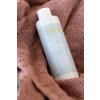DISANA Wool Shampoo, 200 ml
Detergent with soapwort extract for washing wool, cashmere, silk, etc. Without perfumes. Made in Germany.
Product detailed description
Disana shampoo for wool and silk
Our wool shampoo matches to the very specific demands of natural wool. It preserves the sensitive wool fibres and minimizes the risk of a possible felting by washing. An extract of panama bark acts as natural foam former and improves the cleaning power, also with cold hand washing. As a concentrate, it can be used very sparingly and is sufficient for many wool and silk washings. Free from fragrances, environmentally friendly, skin-friendly.
- Content 200ml concentrate
- For hand and machine washing
- It is enough to use only a little product with each wash
- Without perfumes
- Made in Germany
Additional parameters
| Category: | Care and health |
|---|---|
| EAN: | 4250021600567 |
Be the first who will post an article to this item!
Disana natural children's fashion in BIO quality
Children are the most precious thing we have. They need a lot of love and protection. That's why we try to give you everything we can. It includes a healthy "second skin" - clothes that are made ecologically from materials that are as natural as possible.
Children's and baby textiles made from fabrics that are as natural as possible - Imma and Dietrich Sautter founded Disana with this idea 40 years ago. What started with a washable nappy system has evolved over the years into a wide range of baby and home textiles. However, the idea behind it has always remained the same.
As an ecological company, Disana has been at the forefront of the sustainability movement since the very beginning
Clothing made from controlled, organically produced raw materials, which for Disana means the use of pure natural fibers such as Merino sheep wool from controlled organic animal breeding, cotton from controlled organic agriculture and silk. Animals and nature should not be abused during production and should be treated with respect. Short production routes in-house to ensure high product quality; all components such as buttons and sewing threads are made from natural materials and renewable raw materials; Maintaining contacts with all suppliers and partners within the textile chain, often for many years; Adherence to high ecological standards and regular testing of pollutants by independent institutes.








